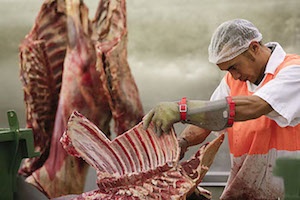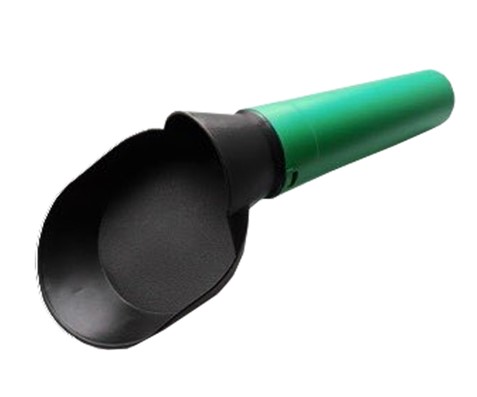Will artificial meat destroy the planet?

Over the past 60 years, meat production on the planet has increased by almost five times. And the more cows are bred, the more they emit methane, one of the causes of the greenhouse effect. Therefore, in some countries they decided to replace natural meat with artificial. But it turned out that the environment can suffer even more from this: for every kilogram of minced meat grown in bioreactors, there can be 25 times more ozone-depleting emissions than for a kilogram of a natural product. What is cellular meat and what it is eaten with, the Parliamentary Newspaper found out.
How it works
Prototypes of artificial meat, which is grown from animal cells, have been presented in several countries. Open tastings were held in Japan, Australia, South Korea and China. And in Singapore last year, cell meat began to be sold in butcher shops. In China, New Zealand and Australia, there are even government programs where you can get grants to launch such projects, said Danil Maklakov, founder of a cell meat startup in Russia.
In Russia, scientists received samples of artificial meatBelgorod State National Research University. The technology was chosen as follows: scientists take stem cells from an animal, that is, cells capable of forming various tissues of the body, Sergey Nadezhdin, an associate professor at the university, told Parliamentary Newspaper. The biomaterial is placed in vials - wide test tubes with an area of 25 square centimeters - with a nutrient medium, where vitamins and microelements are added for cell growth and reproduction. A few days later they are transferred to a bioreactor - a liter glass vessel, where they keep the temperature plus 37 degrees Celsius. Three weeks later, scientists pour out the nutrient liquid from the vials and get cellular minced meat in the dry residue.
According to Nadezhdin, 400 grams of meat can be grown from one gram of cells. But it’s too early to talk about industrial scale, since these are laboratory studies .
Projects for the creation of artificial meat were launched both in Kazan and in Moscow. But the matter did not go further than this. You won't find it in stores and restaurants. The artificial analogues of meat that they offer are not a substance grown from animal cells, but products based on plant components, usually soy.
most expensive hamburger
They are still looking at cell meat. There are many questions for him. So, scientists at the University of California found that its production can adversely affect the environment. The study was published on the university website. Experts have calculated that the mass production of artificial beef is fraught with a sharp increase in the volume of carbon dioxide and other gases that destroy the ozone layer.
Although these products were developed in order, on the contrary, to reduce the dangerous consequences. Over the past 60 years, world meat production has grown from 70 to 337 million tons per year. By 2050, global demand will double again. This means that emissions of greenhouse gases will also grow, mainly methane, which is emitted by cows. Since livestock accounts for about 18 percent of all anthropogenic emissions of gases that destroy the atmosphere, such an increase is worrisome. Therefore, they began to develop other ways to create meat, including growing it in test tubes. The logic seemed to be correct: if there are fewer cows, then there is no need to cut down forests for pastures, waste water and other resources.
But it turned out, not everything is so simple. To grow cellular minced meat, you need industrial-scale bioreactors that will leave a significant carbon footprint, according to the University of California. According to their calculations, depending on the technology, each kilogram of beef from a test tube will have 1.25-25 times more emissions than a kilogram of regular beef. Depending on geography, the diet of the calf and other factors, beef production releases between 9.6 and 432 kilograms of emissions into the atmosphere. The median value is 60 kilograms. And with different production methods, there will be from 19.2 to 1508 kilograms of CO2 equivalent in a test tube.
British scientists are in solidarity with American scientists. In their opinion, if the meat enterprises of the future run on oil and coal, they will cause irreparable damage to the climate.
So far, the production of such meat really requires much more energy and resources than traditional production, Elena Sharoikina, chairman of the Commission on Ecology and Environmental Protection of the Civic Chamber of the Russian Federation, told Parliamentary Newspaper. “If you bet on the creation of artificial meat in the laboratory, then in the very long term. The test-tube hamburger was first introduced 10 years ago, costing over $300,000 to produce, and took three months to grow. Similar projects are being implemented by scientists in many countries of the world, but industrial production is still very far away,” she noted.
In her opinion, it is much more promising and safer for the environment to develop a market for alternative plant-based protein products. In everyday life, it is often called vegetable meat. According to Sharoikina, its consumption is growing all over the world, and this is especially noticeable in Russia. There are already several producers in the country who make such a product from raw materials grown in the country, and, according to the expert, they need to be supported. For example, in the Belgorod region, the production of vegetable meat with a volume of eight thousand tons has already been launched, it is planned to increase this capacity to 40 thousand tons, Deputy Prime Minister Dmitry Chernyshenko said during the "government hour" in the Federation Council on February 15.
Natural is juicier
From the point of view of nature pollution, the creation of meat in bioreactors is still a little-studied issue, Rashid Ismailov, chairman of the Russian Ecological Society, told our publication. “But what needs to be studied first of all is the risks of using artificial meat for human health,” he said.
According to Sharoikina, experts fear that the production of meat in the laboratory will require the use of more antibiotics , as well as artificial hormones, to ensure its growth. “We need to understand how this will affect the health of consumers. In addition, the issue of the nutritional value of such products requires additional study, ”said the head of the commission.
How much consumers will like the taste is still unknown. Unlike natural meat, there is no fat in artificial meat, and it tastes less juicy, director of the Center for Bioelementology and Ecology of Sechenov University Professor Anatoly Skalny shared his feelings.
According to scientists who develop cell meat, its taste and quality depend on the nutrient medium in which the cells proliferated. In order for it to correspond to its natural counterpart, the substrate must contain amino acids, vitamins, and trace elements.
In addition, according to Skalny, today the cost of artificial meat is very high. In Russia, it is too early to talk about its entry into the market.
Products based on cultured stem cells are already not ready to eat 59 percent of the country's population. This is evidenced by the data of the NAFI analytical center.
“I would never eat it in my life,” Ekaterina Altabayeva, deputy chairman of the Federation Council Committee on Science, Education and Culture, admitted to Parliamentary Newspaper. “We hear from the Minister of Agriculture Dmitry Patrushev that last year there was an absolutely fantastic harvest, the production of meat and milk is growing.”
Products based on artificial meat should be controlled by Rosselkhoznadzor and Rospotrebnadzor, the deputy chairman of the Federation Council Committee on Agrarian-Food Policy and Environmental Management Elena Zlenko is convinced. In addition, she reminded, Russia is not threatened with problems with a lack of pastures. “We have a lot of unused agricultural land, we have huge open spaces, and our task is to use them effectively,” Zlenko emphasized.
The senators noted that the country could well feed people with natural products - tastier and cheaper.




























































